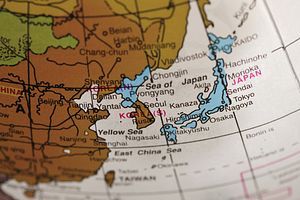With the lineup of Prime Minister Shinzo Abe’s new Cabinet now set, it must go about the business of picking up and carrying on the ruling LDP government’s key policy initiatives. On the diplomatic front, there have already been signs from two Cabinet members that expressed an interest in easing tensions with Japan’s Northeast Asian neighbors. Abe has made it clear that he wishes to meet with his counterparts in both China and South Korea, and has held out the possibility of even visiting Pyongyang. China for its part has recently shown signs of being amenable to a visit between Abe and President Xi Jinping, although the path to a sideline summit at the upcoming APEC meeting in Beijing is far from certain.
After the new Cabinet’s announcement, Foreign Minister Fumio Kishida (one of the few ministers to retain his previous post) made specific conciliatory overtures to China and South Korea. According to the Jiji Press, Kishida said it was important to enhance communication with Seoul as it is “an important neighbor that shares the same basic values with Japan.” He also noted China and Japan’s shared responsibility for regional peace, and that he was eager “to help the two countries hold high-level political talks in the future.” He also referenced the ongoing discussions with North Korea over Japanese abductees, and said Japan was looking for a “comprehensive solution to all pending issues,” to include Pyongyang’s ballistic missile and nuclear programs.
The new Trade and Industry Minister Yuko Obuchi, one of five new female Cabinet members and the daughter of former Prime Minister Keizo Obuchi, indicated a desire for improved relations with China and South Korea. She has been heralded as the best candidate to become Japan’s first female prime minister by Sapio magazine, and during an interview with Bloomberg News said “[my] father’s influence has made me work hard on issues to do with South Korea and China… If you don’t meet face to face and talk both countries start to get a bad impression of the other.” Her father famously made a joint declaration in 1998 with South Korean President Kim Dae Jung in which he apologized for Japan, and the “tremendous damage and suffering” it had caused during the Second World War.
On the same day that Japan announced its Cabinet, China was commemorating the 69th anniversary of the “Anti-Japanese War.” Amid fiery anti-Japanese rhetoric, in which Xi said “The anti-Japanese aggression efforts which involved the whole nation are an important ‘magic tool,’” and that “We must get prepared for many great battles with new historical characteristics as the country is striving to achieve its goals,” he also made what could be interpreted as conciliatory statements toward Japan. Xi said “China is ready to promote the long-term, steady and healthy development of Sino-Japanese relations.”
Both Cabinet members have emphasized meeting directly with South Korea and China’s leaders, something Abe is very intent upon. While marking the date officially recognized by China as the end of Sino-Japanese hostilities (an occasion usually marked by antagonistic and nationalist rhetoric), Xi made very rare public remarks that indicated he could be open to dialogue as well. There are still two months until the November APEC summit, during which time any number of things could happen. Abe has made a point of avoiding nationalist or antagonistic statements toward China, and has not visited the controversial Yasukuni Shrine this summer. It appears that both leaders are open to meeting, Abe obviously more so that Xi. Nonetheless, satisfying domestic sentiment is still likely to trump any diplomatic gains for China in agreeing to a summit with Japan.
































